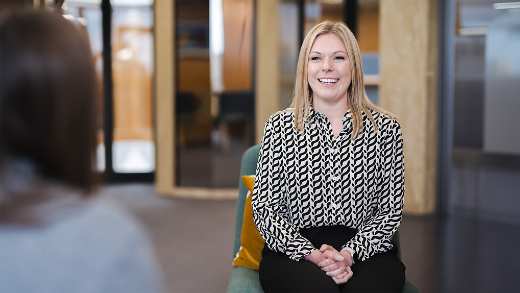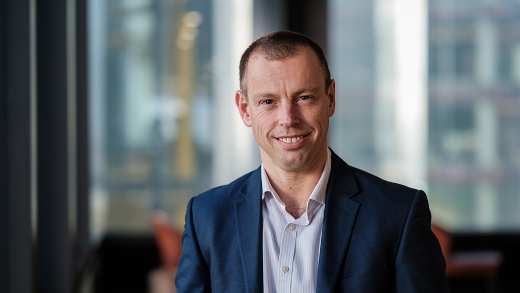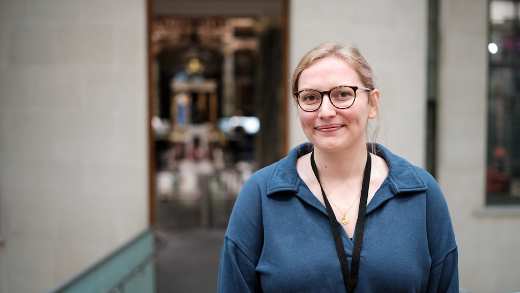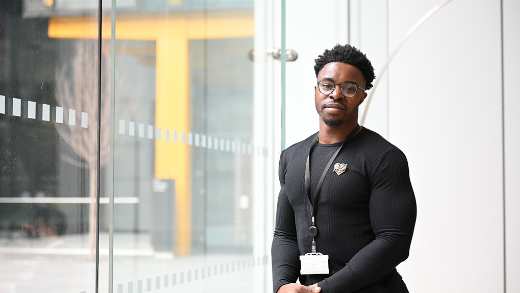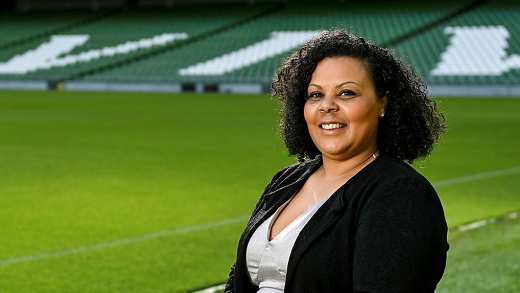The Aviva Foundation wants people to feel in control and positive about their financial futures. Find out how they are supporting organisations to transform the lives of those who need it the most.
In a small Norfolk town, a man sits in a dark, cold house. No television. No internet. Not even the hum of a fridge. He turned that off months ago.
"It's only me now," he says. "What does it matter?"
Helping the UK get ready for the future
At Aviva, we want to help people deal with life’s changes and shocks; it’s the reason we exist.
By preparing people for the future, we’re helping the UK get ready to face a variety of challenges and opportunities, now and in the future.
But we can't do it alone. So, the Aviva Foundation was created to partner with organisations that can support people when they need it most.
He's been through a tough time. With a breakup leaving him isolated and mental health struggles, he hasn't worked in a long time.
Living in the dark feels like the only way he can afford to get by.
His story is extreme, but it isn’t unique.
That's why financial resilience is so important. It's not about being rich, it's about being able to handle whatever life throws at you. It's about being able to plan for a better tomorrow.
Sometimes though, it's just about keeping the lights on.
That's why the Aviva Foundation is backing organisations like Future Projects.
Based in Norfolk, Future Projects works to help people most in need – particularly people they describe as left behind by existing services.
"Almost everything that people come in to see us about is rooted in finance," says Grace, Support Services Manager at Future Projects.
Whether it's dealing with benefits and bills, helping people to gain new skills, find higher quality jobs or even just a chat over a hot cup of tea, Future Projects is there in the heart of their community, working to get their service users ready for whatever the future brings.
"We've got a wealth of success stories," Grace says, talking about their Baseline Centre, in the Marlpit Housing Estate. "Because some proper miracles do happen in our centre.
“We're literally changing people's lives every day."
More than just budgeting
People often come to the Baseline Centre when they feel like they’ve run out of options. It's a safe space where they're not judged, just supported.
They might need food vouchers, help getting online to apply for jobs, or just a warm place to sit for a while.
At the Baseline Centre, they believe in a "no wrong door" policy.
“If somebody comes in saying 'actually, I need help', we will do whatever we can; whether that's signposting them to the correct service or dealing with it ourselves.
“Most of the stuff that we get is people really struggling to pay their gas and electricity, and actually keep food on the table for their families.”
For many families, financial resilience is about being able to survive the week, not saving for the future.

"When we look at the people we see day in and day out," Grace explains, "Financial resilience really does mean 'How on earth am I going to get through the weekend with the kids off school?'
"That is what our service users are looking at as financial resilience, let alone having a buffer of a few hundred quid."
This means that their support needs to focus on practical, tangible solutions, increasing incomes, and addressing the root causes - not simply teaching budgeting skills.
Transcript for video Grace from Future Projects on budgeting
You can't teach somebody to budget their way out of poverty.
You really can't.
If they have not got enough coming in to cover the essentials and the priorities that they've got going out, no amount of budgeting is going to save them.
“You can't teach somebody to budget their way out of poverty.” Grace says. “You really can't.
“If they don’t have enough coming in to cover the essentials that they've got going out, no amount of budgeting is going to save them.”
The Aviva Foundation’s funding has meant that Future Projects has been able to hire an extra member of staff for their front-line team, dedicated to helping people with those root causes.
“It’s been incredible, having that extra person there. She’s been able to take on a colossal amount of people. I mean, she’s a powerhouse. She did not stop.
“The success stories are just mind blowing. I mean, she’s changed lives. She’s saved lives.”
Transcript for video Grace from Future Projects on the impact of the Foundation funding
So having that extra person there to take on a colossal amount of people, the individuals that she saw over that time was beyond expectation. I mean, she's a powerhouse. You know, she did not stop.
But, you know, we are overwhelmed... but it added an extra pair of hands to that team, which meant the amount of people we were seeing was absolutely incredible.
The success stories that have come out from that project are just mind blowing. I mean, she's saved lives. She's changed lives.
Understanding the struggle
When it comes to addressing root causes, though, you have to understand them before you can tackle them.
That’s why the Aviva Foundation is also supporting Nest Insight.
In their ‘Real Accounts’ project, Nest Insight has been talking to 44 households with ‘low to moderate income’ and looking at their spending habits to understand how they manage money.
Sope Otulana, Head of Research at Nest Insight, explains, "There isn't enough research on those with the lowest levels of income.
"We're trying to understand whether people are coping, and how they’re coping,
"We're trying to understand whether there are particular groups who are doing better or worse than others, and how the situation has evolved over time."
The price of peace of mind
Sope elaborates, "We have a pretty good sense of what we would call 'income volatility' or 'spending volatility'. So, the ways that people’s spending and earnings goes up and down, month by month, or paycheque by paycheque.
“We have a less clear sense of what's actually happening in the household. How are partners negotiating and making decisions based on how their income has gone up or down?"
The research has uncovered surprising decisions.
Transcript for video Sope from Nest Insight talks about the trade-offs and strains of irregular vs. regular income
So we have a couple of households who we're working with who have made what might seem like a counterintuitive choice, which is that it's actually easier to manage their lives and their finances on less income that's more regular, as opposed to more income that is unpredictable.
So we have folks who have experienced in the past earning higher than they’re earning now. But the fact that they didn't know when they were going to be paid or exactly how much they were going to be paid meant that they would miss bills, they would get into rent arrears and that sort of thing just created a lot of challenges, and planning for them was really, really challenging.
And so they've made decisions such as switching their entire careers towards fields that allow them to have a much more predictable income.
So, for example, we have a participant who lived her whole life working as a musician and has retrained as a librarian because she knows that that will afford her a much more stable income, albeit lower as she's starting throughout the beginning of a new career.
And so this is something that is really interesting to us to understand... actually, what is it about not being able to plan when your income is irregular, but you know that bills come out on a very regular rhythm that makes people have to make trade offs like this.
"We have a couple of households who we're working with who have made what might seem like a counterintuitive choice, which is that it's actually easier to manage their lives and their finances on less income that's more regular, as opposed to more income that is unpredictable.”
One woman, for example, left her career as a musician for a more stable job as a librarian – choosing the steady beat of a salary over the irregular rhythm of gig work.
Sope says peace of mind is a big part of why financial resilience is so important. There's a real mental cost to having an unpredictable income.
“One couple we're working with, Chris and Susie [not their real names], they have a really complex earnings situation.
“Susie knows how much she'll earn each month, but not when. Chris’s income is irregular in terms of the amount, but he gets paid regularly.
“So, you can imagine that budgeting for them is a huge challenge”
Their income is all over the place – it comes in at different times and in different amounts. They can't use direct debits and have to pay each bill manually.
They're always adjusting their budget and moving money around just to get by. If an unexpected expense does come their way, it's that much more challenging for them to figure out.
“Do we have enough to cover that?”
“Will your salary come in time?”
Planning for the future feels impossible.
Transcript for video Sope from Nest Insight shares the story of Chris and Susie
So, one couple we're working with - Chris and Susie - they have a really complex situation with regards to their earnings.
So her income is... she knows how much she'll earn each month, but not when she'll get paid. And his income is irregular in terms of the amount, but he gets paid quite regularly.
So you can imagine that budgeting for them is a huge challenge.
They found workarounds for this. The unpredictability of both of their incomes means that they do things like pay every bill manually.
They are constantly checking and rechecking their budget, moving money from one place to another to make sure that it's ready at the moment that it has to go out, and not a moment sooner. They don't set up any direct debits and planning is just... it's just a huge challenge for them.
And that means that if an unexpected expense does come their way, it's that much more challenging for them to figure out “where will we cover that from?”
“Do we have enough to cover that from?” “Will your salary come in in time?” “Will my salary come in time for us to be able to manage and cope with that expense”.
So that's just one example of a situation of a household that we're working with, and some of the ways that they are making decisions and using strategies to manage.
Sope sees the struggles of couples like Chris and Susie as a prime example of the toll that income volatility can take.
For her, financial resilience isn't just about having a certain amount of money. It's about having a sense of security and control, even when things get unpredictable.
In Sope's words, "I think of financial resilience as a point where, even if your income is variable or unpredictable... you are in a place where that doesn't push you towards something like problem debt or depleting your savings in a way that you're not able to catch up from again."
It's about being able to plan and save, Sope says.
“You're able to think about the future and contribute towards it," Sope explains, "and there's also a sense of being able to participate in your present."
This means being able to do things like pay for a school trip without worrying about knock-on consequences.
As Sope puts it, it's about "not being at risk of creating a cycle [of debt] that you're not able to recover from."
A complex puzzle
About the Aviva Foundation
The Aviva Foundation aims to help people become more financially secure. It funds organisations working on new ways to help people prevent and prepare for financial challenges, or deal with and recover from financial setbacks.
The Foundation is independent of Aviva. The funds they use come from unclaimed assets on Aviva’s shareholder registry. These are shares and dividends where no owner can be found, money that would otherwise sit idle. Instead, the Foundation uses that money, along with other donations, for public benefit while Aviva also makes sure that the rightful owner can still claim what is theirs.
The Aviva Foundation is administered by Charities Trust under charity registration number 327489.
The Aviva Foundation recognises that there’s no single, simple way to build financial resilience. It’s a complex puzzle and it has to be worked on from different angles.
“We’re not just looking for a quick fix,” says Alex from the Aviva Foundation. “We’re trying to understand the whole picture. What skills people have, and the barriers they face. This will help us to identify and invest in opportunities with the potential to make a meaningful difference to people’s lives.
“That’s why we support organisations like Future Projects, who are on the ground helping people every day, and Nest Insight, who are really exploring how people handle their money.
“Organisations like Future Projects are based right in the middle of their communities,” says Alex. “They really get what people are going through because they see it firsthand. We trust their knowledge and insights, and we’re always learning from them.”
A problem shared
Alex continues: “We are privileged to work with expert and passionate partners who are looking for new ways to make a difference. People like Grace and Sope are working tirelessly to make things better for people in challenging circumstances.”
The Foundation’s goal is not just to fund the work that organisations are doing, but to learn from them and share that knowledge for a wider impact.
“We want the work we do with our partners to go beyond the people they work with directly,” Alex explains. “It’s about gathering knowledge and insight that can inform, influence and inspire others – helping us all do better. The more we all learn, the better we’ll be able to tackle the issues together.”
As a great example of this, Nest Insight wants to use what they've learned from the study to help others create products and policies that help people like Chris and Susie.
This could mean anything from automatic savings tools that adjust to fluctuating incomes, to financial products that adapt to people's changing needs.
"It's really important that financial services providers think about how they can support people with variable incomes and spending patterns," Sope emphasises.
"There are all types of policy and market solutions that would make sense for our participants... That's our north star in this project.”
A brighter future and a better tomorrow
That man who lived in darkness? He found his way to Future Projects.
The team listened to him, supported him and, slowly, he started to get back on his feet.
"He's absolutely turned his life around," Grace shares, happily.
"He started coming into our centre to try and give back. He was making teas and coffees for people, chatting to people, and having a wonderful time.
“In fact, he’s so busy now with other things that we’re left wondering where our teas and coffees are!"





